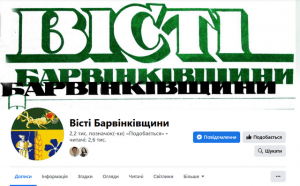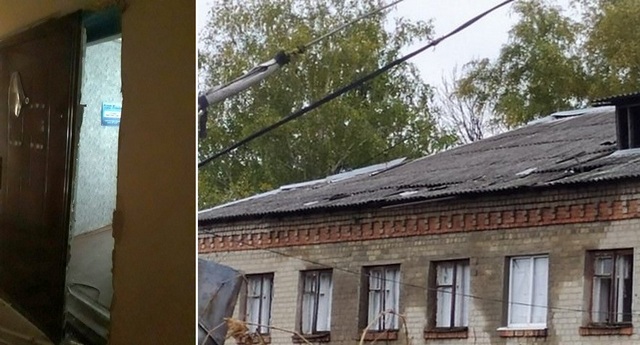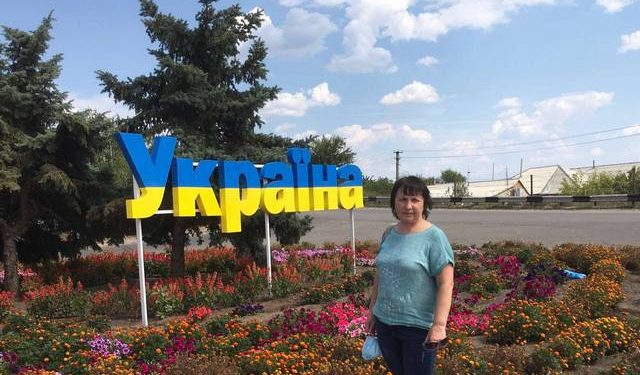Despite the destruction of the newsroom and a long break in the newspaper’s publishing, Visti Barvinkivshchyny, which turns 92 this year, has resumed its printing after a many-month break thanks to the National Union of Journalists of Ukraine (NUJU).
“We have something to tell the readers!” Iryna Stolbova, the publication’s editor-in-chief, emphasized this in a comment to the NUJU.
“As always, we started 2022 with optimism,” says Iryna. “We completed a fairly successful subscription campaign: 2,022 copies of the newspaper were taken. According to a tradition developed over the years, paper for printing the newspaper was purchased with subscribers’ funds. It was stored at the printing house Baldruk in Balakliya. We have been cooperating with that printing house for more than 20 years. We concluded a contract for coverage of activities with the city council. Funds from the subscription under acceptable conditions were kept in an account at Megabank. And suddenly… War, force majeure circumstances are beyond our control.”
Barvinkove came under enemy fire almost from the first days of the war. The first shell hit it in March. Then, it happened again and again almost every day. The newspaper’s publishing was suspended. We started to work in a Facebook group. A summary was submitted daily to cover what services were available during working hours at pharmacies, banks, gas stations, and shops. The address of the head of the Community was posted. It was relevant, brief, and official…
 On March 30, the head of the Community went on the air announcing the evacuation. The city is empty. Journalists provide traffic schedules of evacuation trains, buses…
On March 30, the head of the Community went on the air announcing the evacuation. The city is empty. Journalists provide traffic schedules of evacuation trains, buses…
“We, three newsroom employees, also evacuated,” recalls Iryna Stolbova. “They took office equipment with them. The archive of the newsroom is what confuses us as it was almost 80 binders of the newspaper! It has been collected for 91 years of the publication’s history! The idea was to give all these huge thick stacks of our publication to the local library. Then they decided to move the archive to the deputy editor’s home.”
In early April, the administrative building, where the newsroom rents two offices, was damaged in a bombardment. The blast wave blew away the door. The windows survived – the advice to leave the windows ajar for ventilation worked out. The windows in the neighboring offices were completely blown out. The building has not been restored to this day: no electricity or heating. It was only possible to insert windows and install new doors…
And a few days later, the central library building was hit. Before, we thought of moving the archive of the newspaper there. The building burned to the ground…
From April to October, daily shelling took place in the Barvinkove Community, and the villages of Kurulka, Hrushuvakha, Velyka Komyshuvakha, Pashkove, and Nova Dmytrivka were severely affected.
Pharmacies, Nova Poshta private postal office, Ukrposhta, and banks did not work. Many settlements had no bus or rail communication, gas supply, and electricity.

“We resumed the operation of the Barvinkove-info website and maintained a group on Facebook,” says Iryna. “We wrote about current affairs, activities of the Community, work of volunteers, stories of countrymen, stories about countrymen-defenders. I was personally boosted by colleagues from the newspaper Nove Zhyttia [New Life], the urban-type village of Blyznyuki, where I was evacuated to. They helped, supported, did not allow to give up. I wrote several materials for Nove Zhyttia.”
Another trouble for the activities of Visti Barvinkivshchyny‘s team was the situation with Megabank. This banking institution was withdrawn from the market just before Journalist’s Day, June 3. Its liquidation was announced, and the publication’s account was blocked.
“We ran out of money. No salary. There was no hope to resume newspaper’s publishing,” says Iryna Stolbova. “It was totally possible after the de-occupation of Izium and Balakliya. We are grateful to the National Union of Journalists of Ukraine and its Japanese partners for the allocated funds and for the fact that our newspaper resumed publishing. We publish the author’s materials exclusively. We write about defenders who hold the defense, villages, people… We published the first post-war issue at the beginning of November 2023. Ukrposhta delivered 2,000 copies to subscribers; another thousand were distributed among community residents by volunteers with the assistance of local authorities.”

Subsequently, the Academy of the Ukrainian Press helped Visti Barvinkivshchyny with equipment: now the newsroom has a laptop that allows it to work regardless of power outages and a smartphone. Iryna Stolbova says that the newsroom is very grateful to the partners for updating and modernizing the material base of the newsroom. Therefore, thanks to Visti Barvinkivshchyny, they received stable funding. Now the newspaper has the opportunity not only to pay for the printing and delivery of the newspaper but also to pay the salaries of its employees. “In seven months, we weaned ourselves from such a luxury as a salary,” says Iryna Stolbova.
“The subscription for 2023 was insignificant as many evacuated people have not yet returned to the community,” says the editor. “Unfortunately, there is no money and unemployment in the city; Russian shelling destroyed many houses.”
Currently, the newsroom, fulfilling its obligations to readers, delivers new issues to subscribers of both 2023 and the previous year, 2022, who could not receive their newspapers on time due to the war and the forced layoff. The newspaper’s website is also working, managed thanks to the Ternopil Press Club. And Kharkiv colleagues provided a monetary reward for materials about deserted villages.
“The newspaper was, is, and will be the chronicles of the region, the mouthpiece of important events. We have something to say to the readers. There are some facts to make public in order to testify to Russia’s war crimes on the territory of the Community and the incredible patriotism of our compatriots,” says the editor. “We believe in the future of the newspaper. A newspaper that survived the Second World War and will overcome the challenges of this Russian-Ukrainian war.”

This story about the media was created by the NUJU as part of the Increasing Ukrainian Media Sustainability project financed by Swiss Solidarity and implemented with the support of the Swiss non-profit organization Fondation Hirondelle and the IRMI. Fondation Hirondelle and the IRMI are implementing a project of institutional support for newsrooms of Ukrainian media in the east, north, and south of our country, with an emphasis on the local press. They have also launched a 10-month assistance program for 18 media.

 THE NATIONAL UNION OF
JOURNALISTS OF UKRAINE
THE NATIONAL UNION OF
JOURNALISTS OF UKRAINE
















Discussion about this post